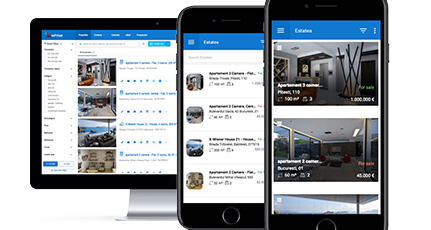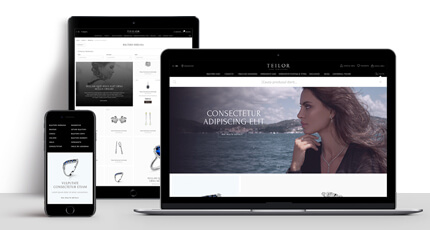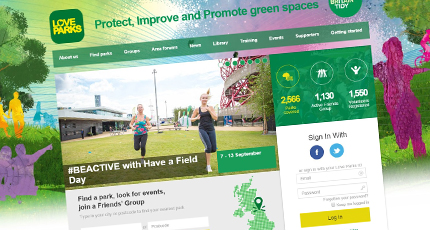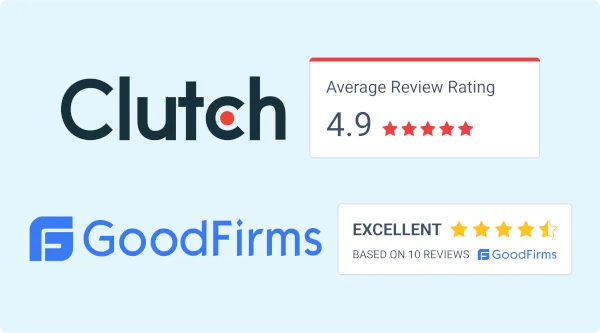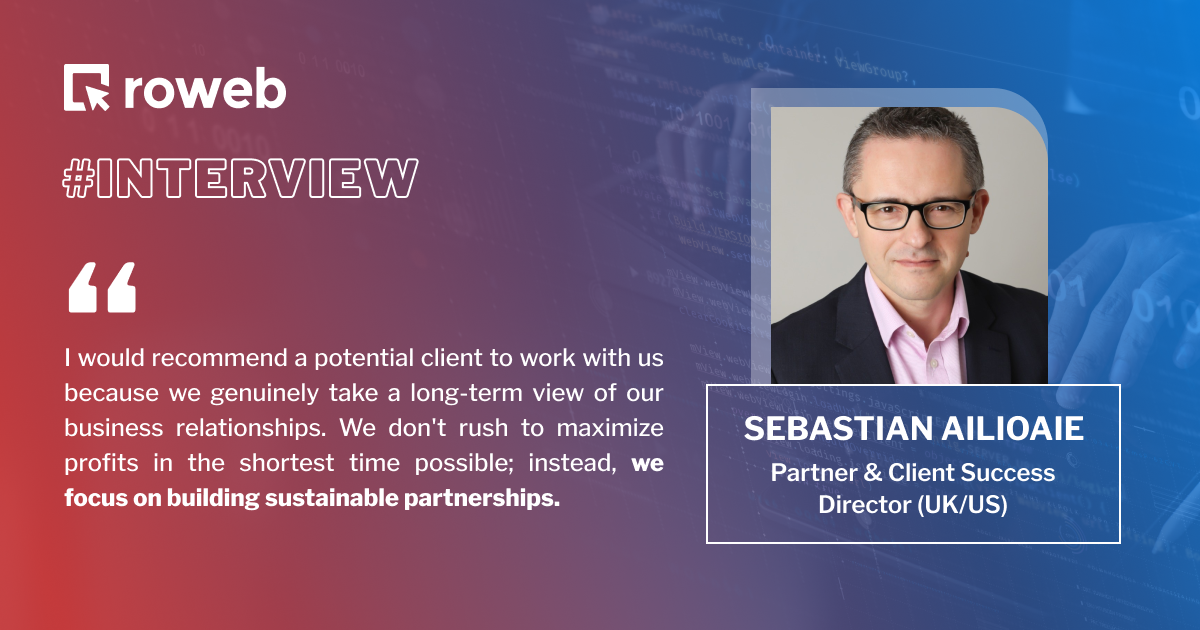
#ForTheLoveOfProgramming – From the Tech Perspective
1. Who is Sebastian?
I am a seasoned digital entrepreneur with 25 years of experience in building cutting-edge software solutions for both clients and software companies across a wide range of industries.
My academic background is also very wide. I hold two undergraduate degrees, one in International Business and another in Law, providing me with a robust foundation in global commerce and legal frameworks.
In addition to my undergraduate studies, I have furthered my expertise with two Master’s degrees. My Master of Arts in Political Science, with a focus on e-Government, underscores my interest in the ways digital transformation can be leveraged to improve governance and public services. Meanwhile, my Master’s in e-Commerce highlights my deep understanding of the digital economy and the strategies needed to succeed in online business environments.
On a personal level, I have been living in London since 2004 and I have 4 teenage kids. I have been working with Roweb ever since we started and I have become from client, a partner and a shareholder.
2. How does the UK IT market differ from Romania?
The UK IT landscape is diverse, with a strong focus on financial technology (FinTech), e-commerce, healthcare, artificial intelligence, and cybersecurity. The UK is home to many global tech giants, as well as a vibrant startup ecosystem that drives innovation across these sectors. This is a great match with the Romanian IT sector which is heavily focused on software development, particularly in outsourcing and nearshoring services for international clients.
Romania, as a country, has developed a reputation for quality in software engineering, embedded systems, and gaming development. In addition, English is widely spoken in the IT sector in Romania and the business environment is becoming increasingly professional and aligned with international practices. We have many clients in the UK, mostly scaleups and large corporations which find a lot of value in the proximity of our offices to theirs both in space and time zones.
Operating costs in the UK, particularly in major cities like London where I live, are among the highest in Europe. This includes salaries, office space, and the general cost of living. Companies operating in the UK often face higher operational expenses, which can impact profitability and pricing strategies. Romania offers significantly lower operational costs, including lower salaries, office rents, and living costs compared to the UK. This cost advantage has been a major factor in attracting foreign companies to establish IT operations or outsource work to Romania.
3. How have you contributed to Roweb’s expansion into the UK market?
I’ve been living in London since 2004, and over the past two decades, I’ve had the opportunity to build a substantial network of business contacts across a variety of industries. This network has been instrumental in developing opportunities for Roweb. Unlike companies that either manage their business development solely from Romania or rely on agents here in the UK, I’ve had my boots on the ground, so to speak, working directly within the market.
Living here for so long, I’ve gained a deep understanding of the local culture and business environment. But at the same time, I’ve been with Roweb since its inception. I know how the company operates, and I’ve established strong personal connections with many of our senior engineers. This dual insight allows me to develop and maintain business relationships with a higher degree of success, as I can effectively bridge the gap between our clients’ needs and our technical capabilities.
Because of this unique combination of local market knowledge and deep company integration, I’ve taken on the role of Customer Success Director. It’s a title I’ve given myself because it reflects what I’m truly passionate about—ensuring our clients not only receive great service but also achieve real, tangible success through our partnerships.
4. How have you noticed customer requirements in the UK changing in recent years? How has Roweb adapted to respond to these changes?
The software development and outsourcing landscape in the UK is evolving rapidly, driven by several key trends that reflect both global advancements and local market dynamics. I will only focus on the main of these trends and how we responded to them.
Increased adoption of AI and machine learning
UK companies are increasingly outsourcing these technologies to gain a competitive edge, leveraging AI for predictive analytics, automation, and intelligent applications. This trend allows businesses to access specialized skills without the high costs of maintaining an in-house team. Us at Roweb have started to invest into the upskilling of our workforce to better use AI themselves but also shifting our development focus from classic tech stack like .NET and PHP to TensorFlow, PyTorch, Scikit-learn, NLTK, spaCy, BERT, Keras, OpenCV, ROS, Apache Spark.
Cloud-native technologies and edge computing
Cloud computing remains a cornerstone of modern business operations, but there’s a growing shift towards cloud-native technologies and edge computing. This transition is driven by the need for scalability, flexibility, and real-time data processing, especially in sectors like healthcare and finance.
We have become cloud native from as early as 2015 and we continue to invest in this direction through both recruiting and upskilling.
Focus on cybersecurity
Roweb has been certified in the past couple of years as ISO 9001 and ISO 27001 compliant and we are continuously trying to improve all our security procedures.
Agile and hybrid methodologies
Agile methodologies, along with hybrid approaches that combine elements of Agile and traditional models, are becoming standard in software development outsourcing. These practices allow for faster delivery, greater adaptability, and improved collaboration, which are crucial in a fast-paced market like the UK.
We have very experienced certified Scrum masters that we make available to clients as either part of larger projects or as standalone.
Rising popularity of custom software solutions
There is a growing demand for custom software solutions tailored to specific business needs. Off-the-shelf products are no longer sufficient for companies looking to gain a competitive advantage. Outsourcing custom software development allows UK businesses to address unique challenges with bespoke applications that enhance efficiency and customer experience.
We have been at the forefront of this trend, having offered our clients for over 20 years the best in bespoke and custom high performance solutions.
Nearshore outsourcing gains traction
While offshore outsourcing (India, Pakistan, Ukraine) remains popular, nearshore outsourcing is gaining ground due to its advantages in proximity, cultural alignment, and time zone compatibility. This trend is particularly relevant for UK companies seeking more control and better collaboration with their outsourcing partners, leading to improved project outcomes.
5. If you were to recommend a potential client to work with the Roweb team, the main argument would be….
I would recommend a potential client to work with us because we genuinely take a long-term view of our business relationships. We don’t rush to maximize profits in the shortest time possible; instead, we focus on building sustainable partnerships.
Our approach is very flexible—not just in terms of pricing, but also in the resources we utilize, payment terms, and our long-term outlook. We see ourselves as a natural extension of the client’s team, fully aligned with their long-term business interests. This alignment allows us to provide maximum value over the long term, leading to a much deeper and more serious impact in delivering their strategic objectives.
6. How do you make sure that Roweb remains competitive in this dynamic market, especially since we are talking about another country?
I would say our pricing model is one of our strong points that will help us stay competitive.
Our pricing model is designed to be as flexible as possible to meet the unique needs of each client. We understand that every project and business has its own set of challenges and constraints, so we tailor our pricing to reflect that.
Firstly, we don’t believe in a one-size-fits-all approach. Our pricing is adaptable based on the scope of work, resources required, and the duration of the project. This means we can offer different pricing structures, whether it’s fixed-price contracts for well-defined projects, time-and-materials for more fluid engagements, or even a retainer model for ongoing support.
Secondly, we’re flexible with payment terms. We can accommodate various schedules—whether you prefer milestone-based payments, monthly invoicing, or other arrangements that better align with your cash flow and financial planning.
Lastly, our long-term outlook on partnerships influences our pricing. We’re not focused on extracting the maximum profit in the shortest time possible. Instead, we aim to deliver value over the long term, which often translates into more favorable pricing for our clients as we build a lasting relationship.
Overall, our goal is to provide pricing that not only fits your budget but also supports your long-term strategic objectives.
In addition to this point about our pricing model, there are a few other approaches we aim to follow while conducting business with our partners:
- UK companies expect nearshore vendors to have a strong cultural fit, which includes understanding business etiquette, working styles, and communication preferences. This alignment helps in smoother collaboration and reduces the potential for misunderstandings.
- Quality is paramount. UK companies expect their nearshore partners to deliver high-quality software solutions that meet or exceed their standards. This includes thorough testing, adherence to best practices in software development, and the ability to meet technical specifications accurately.
- Companies value vendors who can be agile in their approach, adapting quickly to changes in project scope, deadlines, or requirements. This flexibility extends to resource allocation, where vendors can scale teams up or down based on project needs.
- Regular and proactive communication is crucial. UK companies expect their nearshore partners to provide timely updates, raise potential issues early, and maintain transparency throughout the project lifecycle.
- UK businesses expect their nearshore vendors to possess strong technical expertise, including up-to-date knowledge of the latest technologies and development methodologies. This includes experience in Agile and DevOps practices, which are increasingly important in modern software development.
- Proximity, both in terms of geography and time zones, is a key factor. UK companies expect nearshore partners to be available during similar working hours to facilitate real-time collaboration and reduce delays.
- Given the increasing focus on data protection and compliance, UK companies expect nearshore vendors to adhere to stringent security practices and comply with relevant regulations, such as GDPR. This ensures that sensitive data is handled securely and in compliance with legal standards.
In summary, UK companies expect their nearshore software outsourcing vendors to deliver high-quality, cost-effective solutions while maintaining strong communication, cultural alignment, and a focus on long-term partnership.
7. What do you think determines a client to stay with us in a long-term ongoing collaboration? What differentiates us?
What makes us unique, and why clients choose to stay with us for the long term, is deeply rooted in our approach to partnerships.
First and foremost, we get emotionally vested in every project we take on. Their success is our success. We go above and beyond to ensure that the right people are on the job—people with the experience and expertise that precisely match the client’s industry and technology needs.
Secondly, we don’t push on price. We take the long view in our business relationships, unlike the so-called ‘greedy method’ in graph theory, where decisions are made based solely on immediate benefits without considering long-term outcomes. Instead, we focus on sustainable, mutually beneficial partnerships.
In summary, the greedy method involves making the locally optimal choice at each step with the hope that this will lead to a globally optimal solution. However, it’s important to note that this method doesn’t always yield the best result for every problem and NEVER delivers good results in business. If you want this is what NOT TO DO when managing people or working with clients.
Third, we’re dedicated. We work long hours and align ourselves with the client’s time zone when necessary, even if it means an 8-hour difference. We fully integrate with their priorities, and when they face challenges, we take them on as our own.
Fourth, and perhaps most importantly, 80% of our team consists of senior and very senior professionals. This wealth of experience and skill ensures that we deliver top-tier results consistently.
Finally, we are humble. We listen closely to our clients, remain flexible in our approach, and avoid any form of technical arrogance. Our focus is always on finding the best solution, not on being right.
These qualities are what set us apart and create the foundation for long-term, successful relationships with our clients.

8. If you could go back in time, what advice would you give to your early career version?
If I could go back in time and advise my younger self, I would tell myself to be less of a perfectionist and not to try to control every detail.
Early in my career, I often focused too much on getting everything exactly right, which sometimes slowed me down and kept me from seeing the bigger picture. I would encourage myself to focus more on what truly matters, to move faster on the things that have the greatest impact, and to embrace the 80/20 rule—recognizing that 80% of the results often come from 20% of the effort.
By prioritizing what’s most important, I could have achieved a higher impact with the same amount of energy.
#ForTheLoveOfProgramming – The Human Perspective
1. In a parallel universe, you’d like to:
I think I’d like to be a time traveler.
The idea of exploring different eras, witnessing history firsthand, and perhaps even influencing events is incredibly fascinating to me. I’ve always been curious about how the past has shaped the present and what the future might hold. Time travel would satisfy my love for adventure, discovery, and understanding the bigger picture of life. Plus, who wouldn’t want the chance to experience different cultures and innovations across the ages? Just think of Indiana Jones meeting Archimedes in the last franchise. Brilliant!
2. 3 activities that bring you happiness outside work
What makes me happy outside of work is spending quality time with my family, being involved in my church, and connecting with nature.
My family is my anchor, and I find joy in the simple moments we share together. My involvement in church is also a significant part of my life—it gives me a sense of community and purpose beyond my professional responsibilities.
Lastly, I love spending time in nature, whether it’s hiking, walking, or just enjoying the outdoors. It helps me recharge and maintain a healthy balance in life.
3. What do you consider to be the most important assets that help you in your professional activity?
The most important qualities that help me in my work are my speed and ability to process information quickly and deliver it eloquently. I can absorb and synthesize complex information rapidly, which allows me to communicate ideas clearly and effectively. I also have a strong visual imagination and creativity, which help me design products and user interactions that are fluid and optimized for the best user experience.
In addition, I have a good head for numbers—I enjoy working with figures, financial models, and data analysis. This numerical ability complements my creative side, allowing me to balance innovation with practicality. Finally, I have a very keen attention to detail, which ensures that the work I produce is thorough and precise.
However, I do recognize that sometimes this attention to detail can lead me to lose sight of the bigger picture, so I’m constantly working on balancing both perspectives.
4. The most important lesson you’ve learned in all your years of professional experience?
The most important lesson I’ve learned in my professional life is to work with people you have a great gut feeling about—people you feel you can trust and who will have your back in both good and bad times. Trust is the most important, the essential currency in business, and unfortunately, it’s a currency that’s very rare. When you find it, you hold on to it tightly.
Working with people you like, can have a laugh with, and most importantly, can trust, makes all the difference. The rest is just business as usual. But true success, whether within a company or in our relationships with clients, is built on trust. It’s the foundation that allows everything else to thrive.
I would add a few more pieces of advice…
Always remain open to learning and adapting. The business landscape is constantly changing, and staying curious and willing to evolve is crucial. Building strong, trusting relationships is key, but so is maintaining a mindset that allows you to grow alongside those relationships. Don’t be afraid to embrace new technologies, methodologies, or ways of thinking that could improve your work and your team’s performance.
Also, remember the importance of balance—while it’s essential to be dedicated and detail-oriented, it’s just as important to take a step back and see the bigger picture. This balance will help you make more informed decisions that benefit both your team and your clients in the long run.
Lastly, trust your instincts. They often guide you in the right direction, especially when it comes to people and partnerships. Your gut feeling, combined with experience, is a powerful tool in navigating professional relationships and achieving long-term success.
5. Something you’ve always wanted to do, but haven’t had the chance yet:
One thing I’ve always wanted to do but haven’t managed yet is to visit the Caribbean and go on an island-hopping adventure. The idea of exploring the different islands, each with its own unique culture, landscapes, and experiences, is something that has always fascinated me. I imagine it would be an incredible blend of relaxation and discovery, with beautiful beaches, vibrant local communities, and a chance to disconnect from the usual hustle.
While I haven’t made it to the Caribbean just yet, I’ve had the pleasure of taking extensive road trips across Europe, particularly through France, which I absolutely love. There’s something about the French countryside, with its charming villages, stunning landscapes, and rich history, that keeps me coming back. These road trips have been a wonderful way to explore at my own pace, much like I imagine island-hopping in the Caribbean would be. It’s still on my bucket list, and I’m looking forward to making it happen one day.
6. If you could learn any skill instantly, what would it be?
If I could instantly learn any ability, I would love to be able to paint. I dabbled in art during my gymnasium years, but I have to admit that I’m not particularly gifted. Despite that, I have a deep love for art—especially painting and carving. I believe that creating beauty through art brings us closer to God, to the incomprehensible beauty of the universe and creation itself. The intricate, infinite patterns and the fractal-like beauty of the world are awe-inspiring, and I think that being able to capture even a fraction of that through painting would be incredibly fulfilling.
It’s a skill that resonates with me on a very deep level.
7. If you could live anywhere in the world for a year, where would it be and why?
If I could live anywhere for a year, it would definitely be in the south of France, specifically the Côte d’Azur. It’s my favorite place in the world, with its beautiful beaches, stunning architecture, and a level of sophistication that’s hard to find elsewhere. The French cuisine is amazing, and there’s just so much good taste everywhere you look. I love that the high mountains are so close, offering breathtaking sea views, and the coastline—from St Tropez to Cannes and Menton—has such incredible variety in landscapes, culture, and experiences.
Living there would be a dream, but instead, I chose rainy London… go figure! However, I’ve been fortunate enough to spend some full months there over the summers, and it’s something I hope to do again in the future. It’s a place that truly resonates with me, and I can’t think of anywhere else I’d rather spend an entire year.

